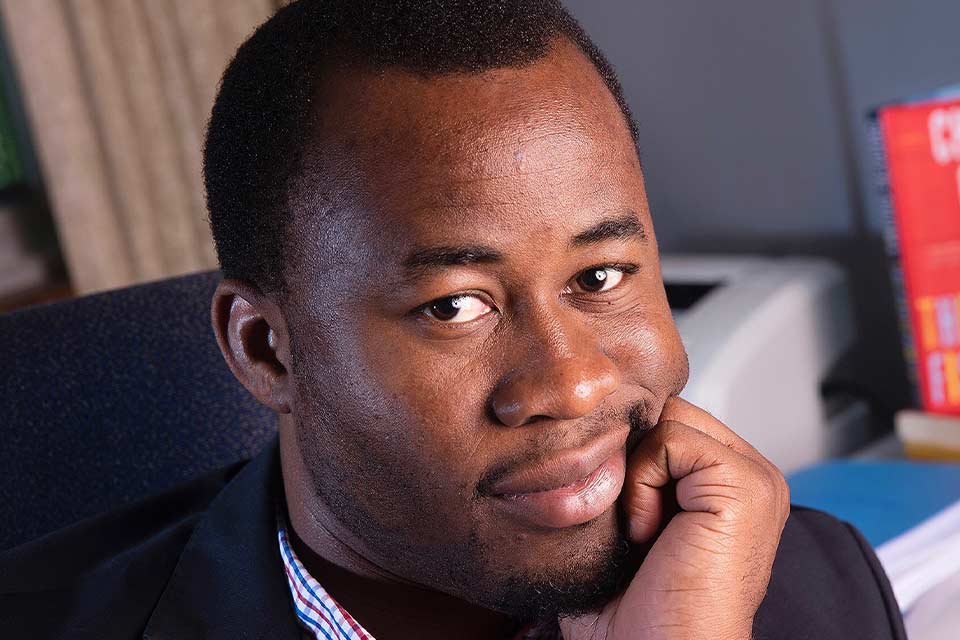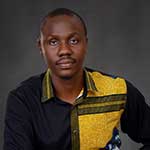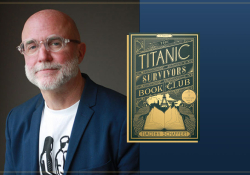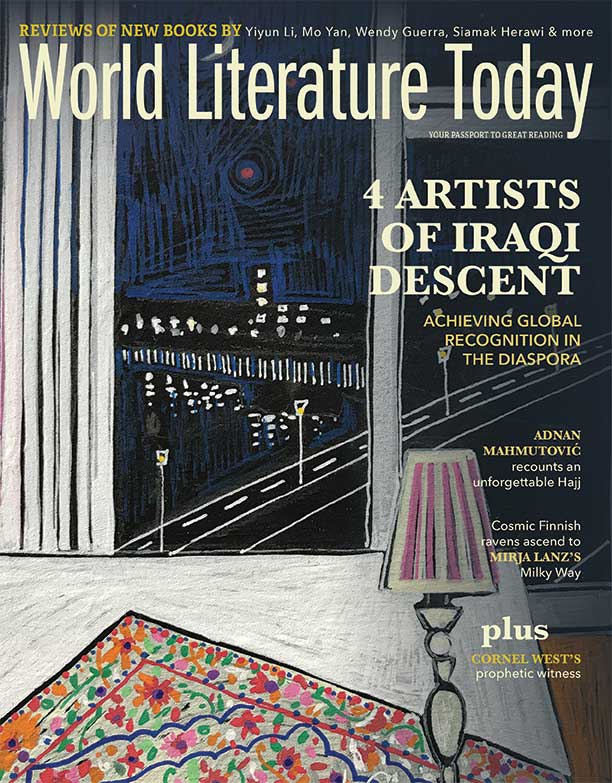Writing, the Gambler’s Art: A Conversation with Chigozie Obioma

Chigozie Obioma, a Nigerian writer and professor of creative writing at the University of Nebraska–Lincoln, took the literary world by surprise in 2015 when his debut novel, The Fishermen, was shortlisted for the Booker Prize. At twenty-eight, Obioma became one of the youngest authors to be so honored. The Fishermen went on to be named “Best Debut Novel of the Year” by The Observer, The Economist, Financial Times, and Wall Street Journal, among other publications. Obioma’s second novel, An Orchestra of Minorities, a Booker Prize finalist in 2019, merges the spiritual and cultural substances of the traditional Igbo worldview to account for the fate of contemporary characters. His third novel, The Road to the Country, a Biafran War fiction, is forthcoming from Hutchinson Heinemann.
Darlington Chibueze Anuonye: In 2015, at the age of twenty-eight, you published The Fishermen to global acclaim, and it was shortlisted for the Booker Prize that year (WLT, Nov. 2015, 63). That was the second year in which the Booker, since its first award in 1969, extended beyond the UK, the Commonwealth, the Republic of Ireland, and Zimbabwe. By emerging as a finalist in such an international competition, you achieved a solid literary success that resonated with many struggling young African writers who saw in both your youth and your gift a testament to the validity of their dreams. When An Orchestra of Minorities emerged as a finalist for the Booker Prize in 2019, you became one of the few African authors to be shortlisted more than once for the prize. What are the impacts of the Booker recognition on your career?
Writing is not easy: it is art, and therefore a gamble.
Chigozie Obioma: Thank you for your kind words. I think you know by now that writing is not easy: it is art, and therefore a gamble. No one ever sets out knowing how their work will be received. You can have a hunch that something positive can happen, but you must simply face the work and make sure you realize your artistic vision beyond all else.
Now, let me emphasize the term “artistic vision.” This is simply the wholistic portrait, a kind of unwritten map, you have in your mind concerning said work and what you want to achieve with it. In my own experience, that map/vision is always so grand it can be sometimes overpowering. So, my work when in the field of writing is actually all about trying to meet the vision as faithfully as possible. Most of the time, if I achieve 50 percent of the initial vision, the work is a success to me. But the ideal is 60 to 70 percent. I don’t believe it is possible to achieve the vision at full scale for any project ever. Perhaps, at some point I might try this, but I’m also wary of overexerting myself.
So, what am I saying here? I think what appeals to people in my work—if anything appeals—is a sense that I have tried to grapple with something big and significant, even if just significant to me and my people, as is the case of Odinani in An Orchestra of Minorities.
In essence, I think this is perhaps why both novels have gained recognition from the Booker Prize and other prizes around the world. Of course, the prize changes lives. I don’t believe anyone would be reading me today if not for the Booker. Even a longlist, due to massive coverage, brings you so many readers, let alone a shortlisting. So, I’ve been very lucky and very grateful, which was why I agreed without hesitation to judge the prize since it has done so much for me and my career as a writer.
Anuonye: You told Amanda Curtin that you wrote The Fishermen as a tribute to the love growing between two of your older brothers who did not get along so well as teenagers, as well as a commentary on the checkered relationship between the previously independent nations and tribes that make up Nigeria. I am interested in the madman. So much has been said about his symbolic characterization as the force of colonialism, but I am thinking of him now simply as a sick man in need of rehabilitation. I think readers may appreciate the character’s humanity if he is read as a sick body living in a traumatic space. Does the neglect of the madman’s mental health not raise questions about how we treat the mentally ill in our society?
Obioma: One of the things that manifests in my style, I hope, is that I think in symbols and metaphors. Even in ordinary-day speeches, I sometimes can only express myself through analogies. So, analogies, figurative language, almost come naturally to me. Therefore, for me, Abulu is not “a madman” but a disruptor—the thing that comes between this unified polity and fractures it. In Yorubaland, if anyone comes into a place uninvited or disrupts something, the instinctive response is to call them “were!” Were means madman, or crazy. That’s the mode in which I was thinking.
Of course, Abulu cannot exist in the novel as just a symbol; he has to be realized at a character/human level. It is at this level that his “madness” begins to matter. I believe I address this in the novel as a critique of the lack of social safety net and also the selfishness of the people who want him to remain on the streets because he helps them sometimes. That’s part of our problem in Nigeria: I believe, at large, Nigerians tend to be selfish. Which is why you see those in power pilfering for themselves and families rather than the common good. It manifests in the way we rush forward when a plane lands without care for others, or in how we pray at church: “This is my year of abundance! I will be this or that!” An almost neurotic focus on the self is baked into the culture so much that people like Abulu have no choice but to remain Abulu.
But beyond all these, I want to create unforgettable characters. For me, this is the thrill of writing. Abulu, I hope, will linger in readers’ minds for years after they’ve closed the book.
Anuonye: It is easy to focus so much on the victimhood of the brothers, as most readers of The Fishermen tend to do, and not see that the rivers and the aquatic bodies in the novel are also victims of human exploitation. In this age of increased environmental concern, is it not necessary to move beyond a human-centric approach to literature and pay some attention to the co-victimhood of human and nonhuman characters in the
novel?
Obioma: I think readers come to a work of fiction with their own concerns. Of course, a religious reader like my born-again younger sister will see the fracturing of the relationships and tragic loss of the older brothers as a lack of serious spiritual intervention (Ikenna rejects God and Christianity as the prophecy grows in him). An American environmentalist activist would of course focus on the degradation of the other characters like Omiala, the river. Akure and Omiala are characters in the novel, and I’ve been saying this for years.
It’s interesting, a few years ago a couple of readers decided to trace the real river in Akure and sent me videos and photos of what it had become as of 2021. Perhaps I remember it wrong now, but the river is almost fully gone. It’s been overtaken by forestation, sandfill, and needs to be urgently dredged. Its abandonment by a government that can’t even feed its people is a source of sadness for me!
Anuonye: Speaking of nonhuman characters, in An Orchestra of Minorities you create a literary universe dominated by the nonhuman narrator, Chi. Partly omniscient and partly subjective, the novel brings to life the Igbo worldview of the duality of the human form, comprising the spiritual and the corporal. By making Chi the narrator of the novel, you represent underrepresented voices. This is so because the chi is such an important figure in human life in Igbo societies, being the guardian of its host, that it ought to feature adequately in our literature. Beyond its rich embodiment of Igbo mythology, An Orchestra of Minorities explores the exilic consciousness of African immigrants in Cyprus, whose predicaments began in their home countries but are ultimately deepened in Cyprus by both the severity of racism and their own destitution. I suppose that your attention to migrant experiences derives from your interest in centering underrepresented and marginalized narratives and lives, the orchestra of minorities, as you refer to your victimized characters, who are bereft of agency. How do we imagine an agency for these characters and people like them in the world?
I hate trafficking in clichés. Everyone I know these days wants to center something relating to identity politics. It’s tiring to me.
Obioma: It might be that you are right as to my motives around “centering marginalized narratives,” but this was not my goal. I hate trafficking in clichés. Everyone I know these days wants to center something relating to identity politics. It’s tiring to me. Even if we were “underrepresented” before, I’m not sure that still holds today. And by who? Where is my work competing for representation? In Nigeria and across Africa, it’s certainly not marginalized. As a foreigner to other places like China, I have no right to protest that they are not reading my work, though they are (The Fishermen alone has sold over sixty thousand copies there!). My point is, I don’t subscribe to this kind of thinking that is dominant in American academic and literary circles today. I don’t see why I need to “center” anything. We exist and therefore I write about us—Africans, Igbo people, Nigerians, everyone. We are, and there’s nothing to center, in my view.
What I wanted to do is simple: I thought there was a gap in African literature for cosmological novels in the guise of John Milton’s Paradise Lost or Dante Alighieri’s Divine Comedy and sought to fill that gap. I believe it is necessary to monumentalize whatever one can of the fast-eroding worldview and religion that is the Igbo religion/cosmology. This is what I sought to do here. But, of course, there are secondary intentions such as revealing what it means to migrate. Chinonso’s character is based on a real-life character, which I wrote about in a personal essay for The Guardian. Also, I wanted to critique the class stratification system in Nigeria that can stifle social mobility. Chinonso is essentially destroyed because he tries to rise in life. This is the tragedy.
I thought there was a gap in African literature for cosmological novels in the guise of John Milton’s Paradise Lost or Dante Alighieri’s Divine Comedy and sought to fill that gap.
Anuonye: In your forthcoming novel, The Road to the Country, you return to the subjects of sibling rivalry, grief, and spirituality as a thematic trope for exploring the trauma of the Nigerian civil war. What is unique about The Road as Nigerian war literature?
Obioma: What I found during the process of research is that there are two kinds of fiction about a war: wartime fiction (a work of fiction that centers around a war, following characters living through the war) and war fiction (which focuses on the men and women fighting the war, that is, the fighting). There are some notable and internationally regarded wartime novels such as Half of a Yellow Sun, by Chimamanda Ngozi Adichie, and Never Again, by Flora Nwapa. But for a war of such scale, there is no major war novel in at least the modern times. In fact, in the entire canon, I can name only one that comes close to being a strong war novel and at least of international repute, Ken Saro-Wiwa’s Sozaboy. There’s another, 48 Guns for the General, by Eddie Iroh, which was only read in Nigeria. What exists, in spades, are good nonfiction and memoirs on the war—some of them written by the soldiers. The Road to the Country hopes to fill this gap. It is a war novel that covers the thirty months of relentless and brutal fighting in what I now call the Biafra war of independence.
Anuonye: In your interview with Simon Van Booy, you talked about your writing journey, which started at twelve when you grew impatient of waiting to come of age to master the art of writing, as your parents had said you would. Inspired by your admiration of and desire to be like the writers whose works you had read at the time, you proceeded to write your own novel, The Dwarf King, whose manuscript you regrettably lost. Your story reminds me of an anecdote someone shared with me about a boy who had traveled to his hometown for the first time with his father just to see a masquerade festival. His father had told him that the festival would take place the day after their arrival. The boy so eagerly looked forward to the event that he went to bed around 6:00pm, hoping that time would run speedily as he slept. But he woke up around 11:50pm, and asked his father, “Papa, is today tomorrow?” His father came close to him, held his hand, and answered, “No, my son. Today is today.” The response broke the boy’s heart. His tenacity and his eventual agonizing experience help me to appreciate your daring to write at such a young age and to imagine your despair at losing the manuscript. How do you remember The Dwarf King?
Obioma: Thank you for returning me to this experience. What I can say of this is that it reveals that I began writing seriously very early in life. I think, over the years, I built my craft and have grown somewhat. But I think there is still so much to be done. I have kept some habits since then, like writing by hand, which takes a painfully long time. For The Road to the Country, for instance, I covered more than four hundred long pages with sweaty handwriting. It is arduous. But that’s how I wrote The Dwarf King, which I think may now be lost, though I still remember certain aspects of it.
August 2023












